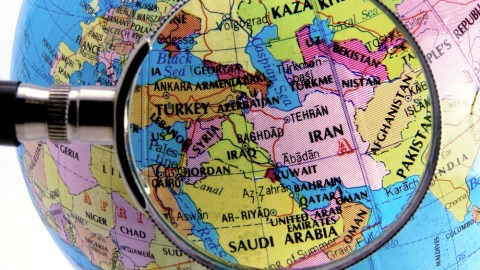France and Britain’s Poorly Drawn Middle East Was Always Destined to Collapse

What’s the Latest?
John B. Judis of New Republic argues that the United States is powerless to combat the breaking up of nonsensical Middle East borders drawn nearly a hundred years ago by colonial powers. This collapse, he argues, is and has been quite inevitable:
What is happening is that the arrangements that the British and French created during and after World War I—which established the very existence of Syria, Lebanon, Iraq, and Jordan, and later contributed to the creation of Israel—are unraveling. Some of these states will survive in their present form, but others will not.
As Judis explains, the names Lebanon, Syria, Iraq, Jordan, and Palestine were affixed to territories formerly of the Ottoman Empire that were parsed out to Britain and France as spoils of World War I.
What’s the Big Idea?
Judis details the saga of border-drawing by colonial powers and the issues it created that are still resonant today. This includes the clumping together of Sunni Muslim Kurds with Sunni and Shiite Arabs within the borders of Iraq. Just take a look at any newspaper or media website to see how well that’s going right now. Although ISIS gets a lot of coverage in the media for their role in the massive upheaval currently raging through the region, they’re really just the small match that finally lit the powder keg.
Judis notes that unrest in these regions only gets stifled when totalitarian regimes and dictators enter the picture, temporarily capping the potential volcanism. The U.S. generally supported these governments as long as they didn’t show any outward antagonism toward Amerca. This changed in 2003:
Under George W. Bush, the United States sought to create a democratic revolution in the region by ousting Saddam. That proved to be futile and dangerous, but the Obama administration appeared to endorse those objectives in 2011 in the wake of the Arab Spring revolts in Tunisia, Egypt, and Libya. At present, the administration’s strategy seems ad hoc—enthusiastically embracing Egypt’s repressive government, while calling for Bashar al Assad’s removal.
Judis points to history and suggests that we’re due for updates to our globes in the near future, likely beginning with a full separation of Kurdistan from the rest of Iraq. What remains to be seen is whether this is just the beginning of a larger worldwide movement to redraw borders in locations still recovering from troubled colonial pasts. I’m looking at you, Africa.
Continue reading at New Republic
Photo credit: charles taylor / Shutterstock





